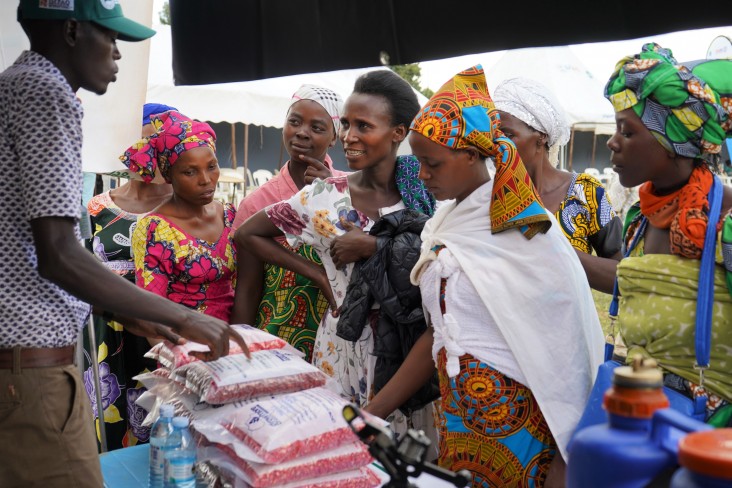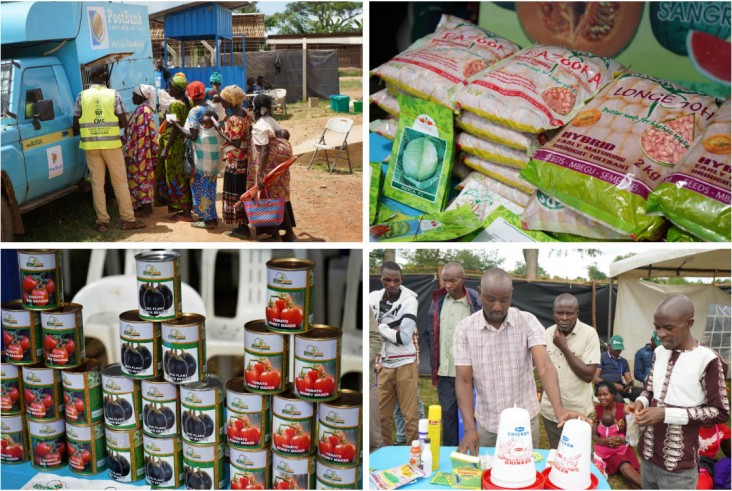Speeches Shim

Refugees’ path to self-reliance
The day opens bright and sunny in Rwamwanja in Western Uganda. Hundreds of people are arriving in the vast field decked by tents and display tables, many by bus, some by foot. Laughter and joyous talk fill the air, as people wearing their Sunday best make their way to the agricultural road show, a first-of-its-kind in this remote region.
“My Village, My Market” is a unique, multi-day networking event for refugees in the Rwamwanja Refugee Settlement and residents of the surrounding communities to connect with entrepreneurs to improve their livelihoods. The participants are here on a mission.
They have received training through the USAID-funded Graduating to Resilience program on improved agricultural practices, business development, and financial management. They have created individual business and household plans to enhance their families’ well-being. And today, they have come to meet agricultural producers and companies to find buyers for their produce and opportunities to carry out their budding business ideas.
“What I have learned is to help myself,” says Anna Marie Ntahundi, a Congolese refugee and a mother of six. “The program has taught me to save for the future and better cultivate the land for agriculture. Today, I came here to learn how to create a business by selling my vegetables. It could change my life!” she says.
USAID’s Graduating to Resilience targets 13,200 refugee and host community households in the Kamwenge District in South West Uganda to help them move from food insecurity and fragile livelihoods to self-reliance and resilience.
Over a few months of training, the program provides opportunities — such as the road show — for the trainees to put their plans into action.
“Since I started the program, my family is growing more food and eating better. We used to eat once a day, now we are having three meals a day,” says Vumiliya Mateso, who fled violence in Congo seven years ago and has since lived in Rwamwanja. Vumiliya grows beans and maize, and wants to earn regular income by selling them.
Dozens of companies and organizations interested in doing business with the local residents have come to display their services.

“We teach farmers how to grow maize, then purchase their yield or direct them to buyers,” says Rita Uwurukundo from Kamwenge Community Development Project. “We work with private entrepreneurs to strengthen their linkages with farmers. Currently, there is more demand than supply.”
By the afternoon, the site is buzzing with action. Community members are crowding around tables full of agricultural products like flour, yogurt, and canned vegetables. Enterprises sell seeds and animal feed, and provide water purification and solar systems. Refugees and locals need goods and services, and many are producers themselves. The nearly 70,000 refugees in Rwamwanja alone form a significant market force and provide the potential for long-term business relationships.
Harvest Plus, an organization promoting highly nutritious vegetables such as orange sweet potato, is here to connect farmers with food producers to turn sweet potatoes into flour and numerous delicious foods, including breads and cakes. “We have a team of farmers we work with. Now we look for ways to partner with refugees,” says Laira Kyazike, Harvest Plus nutritionist.
Uganda has one of the world’s most progressive policies for the more than 1.2 million refugees that call the country a temporary home, providing them land, allowing them to form businesses, and offering benefits from Ugandan social services agencies. Despite this, humanitarian assistance remains an important source of food for a majority of refugee families.
The Graduating to Resilience program helps to reduce refugees’ dependency on aid, while helping hosting communities gain economic and social stability.
As a result of the program, Richard Monday, a Ugandan farmer living near Rwamwanja, plans to start a clothing business so that he can afford to educate his children. “I didn’t have a chance to go to school, but I really want to give that possibility to my children,” he said.
Sifa Furaha, a Congolese refugee and fellow trainee nods her head in agreement. “I dream of a better future for my children,” she says, looking at her 8-month-old baby sleeping on her back. As refugees and host community members link with vendors, the event that day proved to be one more step toward that more hopeful future.

Comment
Make a general inquiry or suggest an improvement.